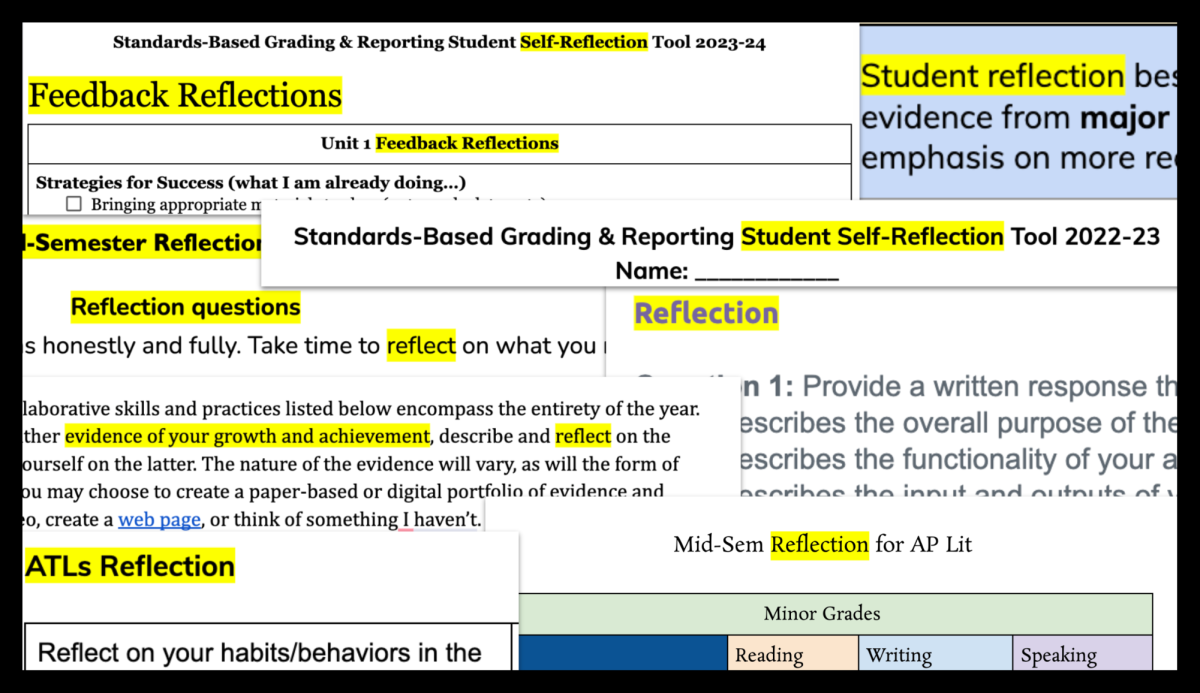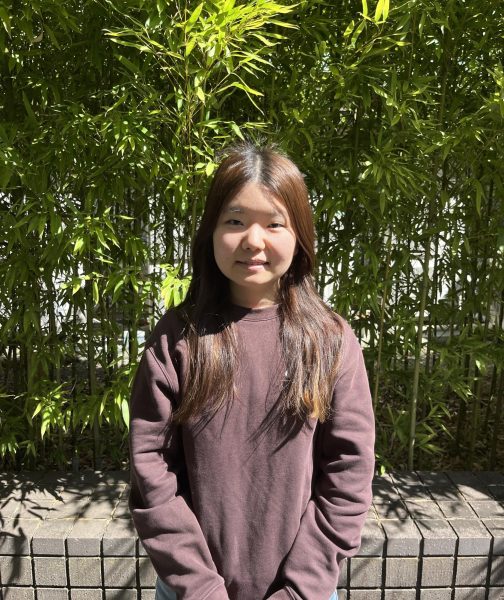Reflections. To some, an opportunity to engage in higher-level thinking to meaningfully review past and present learning experiences, pinpointing areas for growth and strength. To others, a haphazardly finished process co-authored by ChatGPT that turns into yet another task to be checked off among a myriad of other assessments.
However students may view them, ASIJ has intensified its efforts to integrate reflections more frequently and purposefully into the classroom in recent years. Particularly this year, reflections have assumed a more prominent role in classrooms; instead of being viewed as supplementary documents accompanying assignments or majors, they have become the primary assignments themselves in many classes.
To cite a few examples, for students in AP Biology, the entirety of the heredity unit was evaluated based on a “Metacognition Journal” students were required to maintain for three weeks, while those in Personal Fitness started their semester reflecting on their fitness goals and charting a path to achieve them. In some AP Economics classes, students were tasked with identifying case studies of market failures in the real world. Their assessment for the unit was not based on the final presentation they produced, but rather on their reflections on the process.
Incorporating metacognition and student reflection into the learning process is part of the school’s broader effort to shift from an education centered solely on attaining knowledge to one focused on the process of learning. This approach aims to cultivate students as “high-level thinkers” capable of self-reflection, adaptation, and even unlearning previously held beliefs or knowledge.
“What the goal of a 21st-century education will become is the development of metacognition: thinking about thinking, and the ability to control your own learning process,” Dr. Hardin said in an interview with Hanabi in the spring of 2023.
This ethos is echoed by neighboring schools such as Nishimachi International School and Seisen International School, which in recent years have prioritized reflection-based learning and the applicability of students’ learning in a rapidly changing world.
As well as fostering process-oriented learning skills that are relevant across various domains and professions, ASIJ recognizes the importance of metacognition in an evolving technological landscape where information is ubiquitous.
Due to the abundance of accessible information in the current age, “we don’t need to know rote knowledge anymore but need to come up with questions,” said Ms. Becky Naughton, an AP Economics teacher actively involved in developing the curriculum for ASIJ’s upcoming Deep Learning signature course.
“We get a much deeper, richer discussion and solution-based ideas when we can do that, instead of just searching for answers and sticking to what we’ve always known and what’s there—we know that technology can already do that for us,” she said.
According to Ms. Naughton, metacognition marks the next step in modern education. By encouraging students to move beyond retaining knowledge and instead reflect on their thinking patterns, she believes that metacognitive reflections help students gain a deeper understanding of themselves as learners and individuals.
Other teachers have emphasized the role of self-reflection in increasing students’ intrinsic motivation and ownership of their own learning. “If students don’t want to be here and don’t have the motivation intrinsically, I can’t force them to improve,” Mr. Pete Vriend, a Physical Education teacher, explained. “Ultimately, the power lies in that self-reflection piece, which forces students to ask: why am I here? As soon as they know the ‘why,’ then students can get to progressing as much as they can.”
Since 2018, the administration has made numerous efforts to formalize and institutionalize the concepts of metacognition, student reflection, and student autonomy. For instance, an emphasis on reflection to enhance communication is embedded within the school’s Vision of Learning and Portrait of a Learner competencies. Additionally, metacognitive reflections will be an integral part of the forthcoming Deep Learning seminars, which is a part of the core curriculum for the class of 2026 and beyond.
In January of this year, ASIJ also welcomed guest speaker Dr. Ulcca Joshi Hansen, author of The Future of Smart, to address students and educators at both its Chofu and ELC campuses. Dr. Hansen emphasized the significance of mastering complex, interdisciplinary approaches to tackle multifaceted challenges, as well as understanding the underlying “hows” and “whys” of learning.
Although metacognition is proven to assist students in consolidating their learning and improving retention of information, there appears to be a gap between intention and outcome. One of the primary concerns voiced by students is the manner in which it is being implemented, which some say detracts from the meaningful intents of reflection.
“Personally, I understand the value of reflecting in itself,” Berenice Bregeon (‘26) said. “But I don’t think it’s being administered in a way that everyone takes it seriously—it’s given out as a Google Doc you fill out and return, which doesn’t feel as meaningful as I think it should be or could be.” She also adds that as specific strands and competencies are handpicked by teachers for reflection, students “don’t necessarily get to reflect on strands they think they should reflect on.”
Aki Gohdo (‘24) agrees. “Personally, I don’t particularly mind the fact that I have to reflect on my own work, because I feel like it forces me to be very honest with myself, and be very blunt,” he said. “But I also feel like there might be some malicious intent, where people will falsely make their learning process seem more meaningful on their self-reflections.”
Another issue identified by students was feeling fatigued and oversaturated by the abundance of reflections. Amidst semester reflections, mid-semester reflections, unit reflections, and pre-unit and post-unit reflections across numerous classes, the typical ASIJ student is constantly being prompted to engage in reflective thinking.
“For me and my peers, it just feels like something else that we have to do on top of a project,” Koyo Odagiri (‘27) said. “It’s not necessarily something I want to do, but I do see the importance of it in growing and becoming better learners.” As the majority of these reflections are graded, some students also perceive them as having a “right” and “wrong” answer.
“You always have this textbook answer that you could say,” Berenice explained.
This black-and-white perspective on reflections seems contradictory to ASIJ’s stated goal of helping students “lead with understanding of themselves and others” and build intellectual curiosity through metacognitive reflections.
When students are consistently prompted to participate in similar types of reflections using the same format across most, if not all, of their classes, many feel compelled to simply regurgitate much of the same content. Fundamentally, these student concerns raise doubts about the effectiveness and purpose of reflections: are students authentically engaging in reflection, or have they become yet another assignment to complete?
While many students appear to fall into the latter category, Ms. Naughton empathizes with those who find reflecting challenging. “It’s definitely not easy the first time when you’ve been trained to stay in the lines, don’t stick out, and don’t do something different,” she said. Ms. Naughton also believes that students are not intentionally lazy or attempting to game the system; rather, they’re responding to the way that the system—the “game of school”—is set up.
ASIJ is still early in its implementation of metacognitive principles within the classroom, and it appears that there are still numerous areas for growth and concern.
Students have suggested alternative approaches to conducting reflections, such as utilizing surveys or engaging in one-on-one conversations. Koyo suggests that such methods would encourage him to “be more open” and “overthink things less.” Others, like Aki, maintain the belief that there is “no real way to make [reflections] more meaningful or engaging to students in a way that benefits them.”
The compartmentalized nature of reflections within an educational framework that purportedly prioritizes interdisciplinary learning must also be examined closely. “What could also be interesting is not to reflect on your learning by class, but to reflect on your learning as a whole,” Berenice said. Requiring students to repeatedly complete reflections for every subject, despite the generality of the Portrait of a Learner competencies across disciplines, may not be the most effective approach.
“There should be more thought into the universality of reflections, which could be much more meaningful if you could reflect on your learning across subjects, or even stretch it to learning outside of school,” Berenice said.


